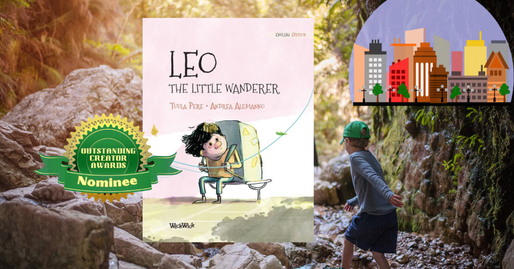|
Leo, the Little Wanderer by Tuula Pere follows a little boy named Leo who loves to wander off on his own and go on cross-town adventures.
Tuula Pere is one of the best children's authors we've ever had come our way. With that said, this one may sit near the lower end of the spectrum as far as overall quality and enjoyability. However, keep in mind that there's context to that: this authors books are usually very good and the author herself is never afraid to take risks. Pere has a very interesting, almost Gothic style to some of her books. While this one isn't necessarily dark, it does raise some questions. For example: why does this boy wander by himself so much? Is he sad? Depressed? Alone? Where are his parents? Why is he so trusting of people he has just met? There seems to be some subtext to this book, as there is to all of Pere's stories. Probably the one thing that stands out like a sore thumb with this booth is the text. The text size is way too small sometimes, especially considering the vastness of the pages (which are pretty much in landscape format). Making things even more challenging, there are pages in this book that are just filled with too much text for a book of this nature. There are parts of this that almost become a sort of middle-grade novel, however featuring a much younger character. With that said, this all isn't unprecedented. The author also wrote a middle-grade chapter book called the False Queen, flexing her ability to write in the genre. Also, the fact that Leo is adventuring on his own is also not unprecedented. Noah's Quest followed a young boy on a heroic journey. Pokemon features numerous children under the age of 12 going out on their own without parental supervision, and we don't often hear criticisms from parents about that. It's all in good fun. Leo seems to be on a quest of personal growth and self-discovery as well as on a physical quest from place to place. Everyone that Leo meets seems to teach him something and impact him in some way. It is actually quite complex, especially for little kids, and we fear it could be a bit confusing for them. There's a lot of existentialism, for instance. We encountered something similar with the author's other work, The Stone Garden, in which the imaginary old man learned that it was important to set his loved ones free instead of holding onto them too tightly. The illustrations are very simple, but simplicity works sometimes. The problem is, the text suggests something big and grand while the illustrations imply something small and simple. This might be a case of an author making a very valiant attempt with a special concept and it just not clicking with the audience exactly as intended. You can still check it out on Amazon and see for yourself!
0 Comments
Leave a Reply. |
Archives
July 2024
Categories |

 RSS Feed
RSS Feed